The article on “Judicial Safeguards for Customs Officers: Revisiting Section 155(2) of the Customs Act, 1962 – A CESTAT Perspective” is written by Dr. Sujay Kantawala who is a legal practitioner and specializes in indirect taxation and service law.
Abstract:
The Customs, Excise and Service Tax Appellate Tribunal (CESTAT), West Zonal Bench, Mumbai, in a consolidated ruling on appeals by four senior customs officers, has offered a judicially robust and empathetic interpretation of Section 155(2) of the Customs Act, 1962. This article examines the key findings, contextual background, legal interpretations, and broader implications of this ruling, particularly for public servants discharging statutory functions under taxing statutes.
Introduction
The case before the Tribunal involved four senior officers of the Customs department—Vinay Brij Singh, Jitendra Bahadur Singh Patel, CY Manikanhaiya, and Ashiquzzaman—challenging the maintainability of penalty proceedings initiated against them under sections 112 and 114AA of the Customs Act, 1962, without due compliance of the procedural safeguards enshrined in Section 155(2) of the same Act.
The Tribunal’s decision, rendered by Hon’ble Mr. C.J. Mathew (Technical Member) and Hon’ble Mr. Ajay Sharma (Judicial Member), marks a significant reaffirmation of statutory protections afforded to public officers, while also setting a precedent for cautious judicial interpretation in quasi-judicial administrative processes.
Factual Matrix and Procedural History
The appeals arose from show cause notices issued to the appellants in connection with the import of fourteen consignments of rough diamonds, allegedly overvalued and facilitating smuggling. The appellants were involved in various stages of the clearance process at the Precious Cargo Customs Clearance Centre (PCCCC), Mumbai.
The adjudicating authority, without fully adjudicating the case on merits, had rejected the officers’ preliminary objections based on Section 155(2) of the Act— which requires prior notice and a three-month limitation period before initiating proceedings against officers of the Government. The Commissioner (Appeals) upheld this view, leading to the present appeals before the CESTAT.
Legal Framework: Section 155 of the Customs Act, 1962
Section 155 offers dual protection:
- Subsection (1) protects against legal proceedings for actions taken in good faith under the Act.
- Subsection (2) mandates that no proceeding (other than a suit) shall be initiated without giving prior notice and must be within three months from the date of cause.
Key Findings of the Tribunal
- Inadequate Appreciation of Section 155(2):
The Tribunal held that the adjudicating and appellate authorities failed to properly appreciate the procedural safeguards required under Section 155(2). The mere opportunity of reply in the show cause proceedings cannot be construed as a substitute for the mandated prior notice and statutory limitation period. - Premature Adjudication on ‘Good Faith’:
The original authority prematurely decided the issue of ‘good faith’, which is a judicial prerogative to be evaluated with evidentiary backing, not at the pre-adjudication stage. Section 155(2) does not predicate its procedural safeguards on a finding of good faith—thus, bringing in such a test was held to be perverse. - Violation of Hierarchical Judicial Discipline:
The Commissioner (Appeals) was rebuked for discrediting binding Tribunal decisions such as Commissioner v. MI Khan and CCE v. Rajiv Kumar Agarwal without a lawful basis. The Tribunal reminded that lower authorities must respect precedents of higher forums as per the ruling in Union of India v. Kamalakshi Finance Corporation. - Concerns on Abuse of Quasi-Judicial Mechanisms:
The Tribunal noted the dangerous trend of subjecting officers to penalty proceedings without judicial safeguards, cautioning that such unchecked actions damage both public service morale and the institutional credibility of the tax administration. - Remand for Fresh Consideration:
The Tribunal remanded the matter to the adjudicating authority, specifically directing a fresh consideration of the claim under Section 155(2) with due regard to its legal interpretation and the timing of issuance of proceedings.
Key Takeaways
- Statutory Protections Cannot Be Bypassed: Section 155(2) stands as a non-negotiable safeguard for officers, and any proceedings initiated without strict compliance are liable to be quashed.
- Judicial Determination of Good Faith: The test of whether actions were done in ‘good faith’ under the Act is a matter for judicial forums and cannot be assumed or decided by executive authorities in preliminary stages.
- Administrative Fairness and Rule of Law: The ruling upholds the foundational principle that administrative processes must not be weaponized or exercised arbitrarily, especially against public servants discharging statutory duties.
- Judicial Discipline is Paramount: Lower authorities must adhere to the decisions of appellate forums, failing which administrative law ceases to function in harmony with constitutional mandates.
Broader Implications
This ruling holds significance not just for customs officers, but for the wider framework of public administration in India. It fortifies the safeguards intended to protect officers from frivolous or mala fide departmental actions. Additionally, it sends a message that quasi-judicial proceedings must be conducted with scrupulous adherence to statutory procedures.
In an era of increasing scrutiny on public functionaries, the Tribunal’s decision brings much-needed balance between accountability and protection, serving both public interest and administrative fairness.
Conclusion
The CESTAT decision in the case of Jitendra Bahadur Singh Patel and others stands as a landmark reaffirmation of procedural justice. It underscores that statutory safeguards for government officers are not mere formalities but essential bulwarks against misuse of power. The ruling will undoubtedly serve as guiding jurisprudence for future cases involving departmental action against officers under taxing statutes.
Read More: Compensation For Delay In Property Handover By Builder Not Taxable: ITAT



